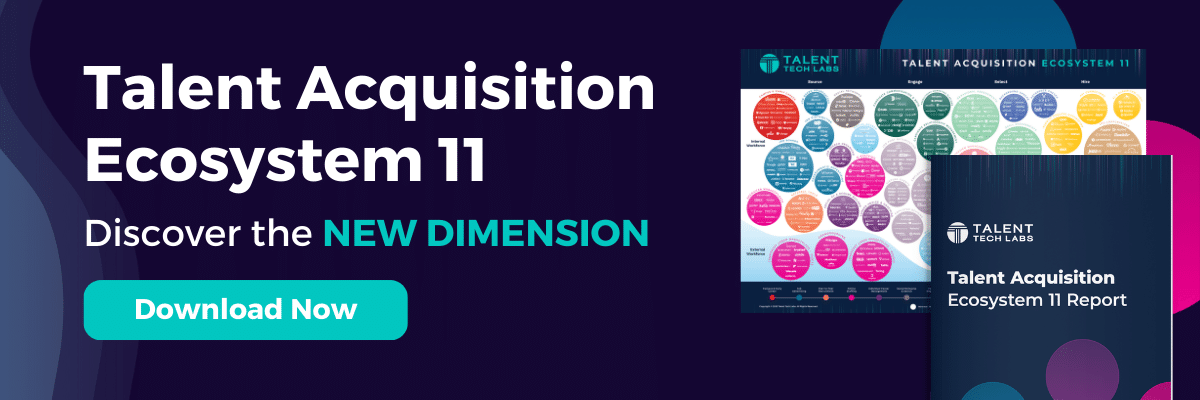Since 2014, Talent Tech Labs has provided actionable insights, accurately predicting trends that impact the talent technology landscape. We pride ourselves on anticipating the shifts shaping the industry, and we’re excited to share our predictions for 2024. Dive further into our insights by watching our 2024 predictions video. Hear from David Francis, TTL’s VP of Research, and senior analysts from the research team as they share their perspectives on what the future holds. Watch the video!
2023 posed one of the most challenging years since the onset of the pandemic for those involved in the talent ecosystem, from hiring organizations to staffing firms and work technology builders alike. At Talent Tech Labs, we are highly optimistic about 2024, given the advances and disruptions occurring in technology right now, particularly around AI, automation, and new ways of holistically organizing work and talent. We believe there has never been a better time in history to realize truly transformative talent strategies.
Read on to dive into the predictions that will shape the talent tech landscape of 2024.
Shift from a Talent Tech Stack Centered around Applicant Tracking Systems (ATS) to Candidate Relationship Management (CRM)
In 2024, we predict a shift from an ATS-centric tech stack to a CRM-centric tech stack. In the last two years, companies have invested more in their CRM than in their ATS. Simultaneously a lot of organizations are rethinking their recruitment tech stack to enhance efficiency through a better candidate experience.
While applicant tracking systems will remain essential to the talent acquisition tech stack, we predict that CRMs will soon be the primary system where recruitment operations take place, and this shift might be what allows companies to fully leverage the value of their CRM investment.
Explainable AI will be Much More Prominent in Talent Tech
We anticipate Explainable AI will play a much larger role in both Talent Acquisition and Talent Management Technology in 2024. Explainable AI is a set of tools and frameworks that enhance the understanding and interpretation of answers generated by machine learning models, including Generative AI.
Generative AI made a significant impact on the market in 2023, rendering information more accessible and digestible. However, it also introduced a “black box” problem, where users found it challenging to identify how the model arrived at conclusions. Explainable AI addresses this issue by building trust and confidence into the AI model.
Generative AI can provide solutions or various options to solve a problem, and Explainable AI takes it a step further by explaining why a specific solution works or how the model arrived at that conclusion. The distinction lies in merely presenting a solution—’this is the solution’—versus understanding the rationale behind it—’I know why this is the solution.’ The importance of Explainable AI is expected to particularly increase in Talent Acquisition due to audit laws.
As previously mentioned, Explainable AI enhances user confidence and trust in the model, facilitating the adoption of new tools with AI algorithms by recruiters and managers. It is also expected to play a significant role in helping candidates understand the rationale behind specific decisions in the hiring process, eliminating guesswork from rejections. Additionally, employees will benefit from understanding the reasons behind recommendations for jobs, courses, or career pathways. We predict Explainable AI will contribute significantly to addressing bias in various AI models and enhancing user trust in them.
Consolidation of Programmatic Advertising and Job Distribution Industries
In 2024, we expect to see the programmatic advertising industry and the job distribution industry start to consolidate. Job distributors specialize in helping organizations source for candidates when they have a particular set of favorite job sites, allowing them to post those jobs across different sites fairly effortlessly, saving time and effort compared to manual site-by-site postings.
In practice, a member of the Talent Acquisition team inputs job postings into the job distribution tool, which then automatically posts those jobs across a network of different job sites. These tools prove invaluable for organizations handling high-volume sourcing, especially for those with limited resources to manage job postings manually.
Programmatic advertising operates similarly by disseminating job postings across a network of sites, but excels for organizations that are more agnostic about the sites where they want to post jobs. These tools leverage data to automatically optimize spending across various job sites, aiming to attract the highest number of qualified candidates. While both tools perform similar functions, they cater to different customers and, until now, they have mostly existed side by side. We’re witnessing a shift as programmatic advertising vendors are starting to acquire job distributors and we expect this trend will persist into 2024.
Big Tech’s Increasing Influence in the Talent Tech Market
Lastly we anticipate a much bigger presence from Big Tech in the talent tech market, particularly in talent management. Over the last few years, talent management has become a more important facet of talent tech due to rising employee expectations and a growing need to measure work within an organization’s point solution. Vendors have realized that creating ‘stickiness’ requires seamless integration into the workflow for both internal managers and employees. For instance, employees are less inclined to use a learning tool if required to log in to a separate system every time, compared to the tool recommending content within the employees’ workflow.
Big tech companies like Google and Microsoft are making significant investments in work tech tools—technology that facilitates work—and are now extending into talent tech, leveraging their existing infrastructure seamlessly. We witnessed this with Microsoft as they expanded their Viva product line, concentrating on engaging employees within their workflow for communications, learning skills, or employee listening.
Another noteworthy example is ServiceNow, which acquired Hitch Works and seamlessly integrated them into their product line, enhancing skills, intelligence, and employee development offerings. This integration simplifies the task for managers, allowing them to assign work based on skill levels. We foresee that these major tech vendors will continue to invest in talent tech, sparking significant competition for existing point solution vendors.
In Closing
As we conclude our 2024 predictions, further explore our in-depth insights by watching our video featuring key members of our research team. Click here to hear from the experts!
For more talent technology insights, stay connected with us!

